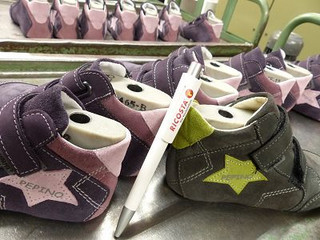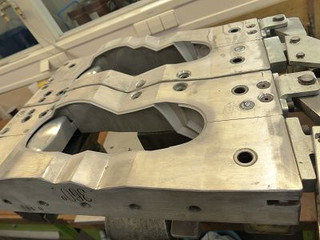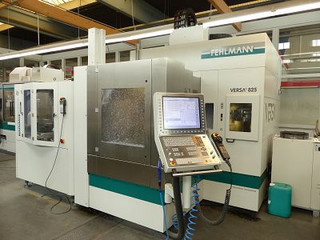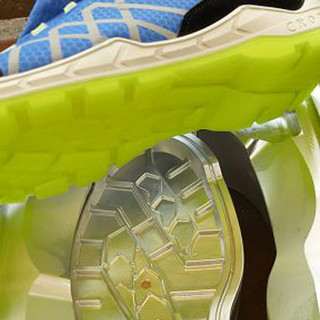Fehlmann's calling card makes the shoe right - the perfect fit
RICOSTA Schuhfabriken GmbH - Having one's own toolmaking shop is not typical for the shoe industry, as the soles are normally manufactured and the molds bought. However, toolmaking is an old tradition at RICOSTA, allowing a high level of the added value to remain within the company. With the Fehlmann VERSA 825 5-axis machining center, including automation, however, the shoe makers in Donaueschingen even went a step further. They deliberately chose to invest in the future.
RICOSTA is specialized in the development and production of children's shoes and has opted using for polyurethane for its soles. Why polyurethane? Because the material admittedly has only half the density of rubber, but is only half as heavy in turn. Approx. two million shoes per year are produced by RICOSTA at their locations in Donaueschingen, Poland, Hungary, Romania and Croatia. This is equivalent to 8,500 pairs of shoes per day. Currently, this requires 10 to 12 mold series in up to 15 different sizes. The necessary tools are exclusively designed, programmed and milled in Donaueschingen. These tools consist of six components: The brace frames on the inside and outside, on the left and right, as well as two models. During the past 10 years, this job has been machined on the 5-axis machining center (3 + 2 axes) PICOMAX 90 by Fehlmann. 2007 was, therefore, the year when RICOSTA became involved in professional shoemaking, as they did not only want to take care of the complex lateral frames themselves, but intended to also design and manufacture the sole models and the mold frames inhouse by investing in the PICOMAX 90 and the related software. This was a deliberate investment in the future. It became clear quite quickly, however, that the frequent change of material on the machine (synthetic resin - dry, aluminum - wet) and the cleaning process were too time-consuming. Peter Allaut, Head of Research & Development, therefore, thought the investment in a further 5-axis machining center inevitable: „Although we were unable to fully utilize the potential of the PICOMAX 90, it was obvious that something had to be done in this respect - especially as we intended to expand our manufacturing range with complex sole models including the related relief milling processes and lateral positionings. Furthermore, we wanted to mill negative models from aluminum blocks in addition to positive ones. Therefore, we needed a machine with which we would be able to simultaneously mill in 5 axes. Additionally, we planned to create more molds for series production. This is why we attached great importance to unmanned operation with automation.“
Compensating for product research and decision making through high utilization rates
Following intensive benchmarking, RICOSTA decided in favor of the 5-axis machining center VERSA 825 by Fehlmann. There was no doubt that Fehlmann had already left a calling card for maximum precision and excellent reliability with the PICOMAX 90. However, this decision was not something to be taken for granted. First of all, there were the possible workpiece dimensions in relation to the dimensions of the automated machine. In this respect, the VERSA is highly compact with travel distances of 875 x 700 x 450 mm (X, Y, Z) and A +/- 115°, B 360°, as well as a footprint of just 2.3 x 3.3 x 3.2 m (W/D/H). Moreover, an appropriate tool magazine (44 tools) and high-accuracy were important to us. Currently, we are talking about machining precision of a few hundredths of a millimeter, thus not yet fully exhausting the accuracy potential. However, according to Peter Allaut, the intention was to invest in the future: „We do not know yet what the future will bring. Perhaps we will one day manufacture injection molds using this machine or mill steel molds for rubber soles. Therefore, it was really important to us to be able to communicate at eye level with Fehlmann as a family business, to enjoy excellent service and to invest in an absolutely reliable and precise machine with the VERSA.“ The molds at RICOSTA do not compare to highly complex injection tools. Rather, we are dealing with a low-temperature/low-pressure process, or casting mold making for short. In the process, the shoe is positioned in an upper mold while the lower mold is filled with polyurethane. Then the mold is closed, the polyurethane expands (rises) and foams up against the shoe.
The interesting thing in Donaueschingen is that only three design engineers are responsible for the process - from the idea to producing the mold, thus designing, programming and milling the sole molds. Matthias Hepfer is one of these engineers and, therefore, not only recognizes the measurable benefits in the VERSA but also in the automation: „We have gone to Switzerland to have a look at the machine concept at Fehlmann on-site ourselves. That convinced us as, did the Heidenhain controls. Admittedly, we are fortunate enough to have received an automation with ten pallets. At present, we are operating with six vices which adds up to approx. 4,000 to 5,000 spindle hours per year thanks to the unmanned operation, which includes night and weekend shifts. This high utilization is of great importance to us as it allows us to be able to adhere to a set time schedule in Donaueschingen. In concrete terms, this means that the times spent for product research and decision making may be compensated for in mold production.
Reliable, precise operation, also on the weekend, despite the workpiece size - surely, other 5-axis machining centers are able to perform likewise. However, the decision-makers at RICOSTA have had only good experiences with Fehlmann and their PICOMAX 90 over ten years, including the excellent service. So the dice had practically been cast: the investment decision was in favor of the VERSA 825 of Fehlmann. Even the considerable amount of the investment could no longer influence the decision.
RICOSTA Schuhfabriken GmbH
As a family business with headquarters in Donaueschingen, RICOSTA has been developing and producing children's shoes for more than 45 years and ranks among the few shoe manufacturers still producing in Germany and neighbouring European countries. The two successful and major brand names are RICOSTA and PEPINO. More than two million shoes per year are produced at the locations in Germany, Hungary, Poland, Romania and Croatia, by a total of 800 employees. RICOSTA was the first children's shoe manufacturer in Europe to be certified according to the Eco-Management and Audit Scheme (EMAS) and to DIN EN ISO 14001. It has also won several prestigious awards in the footwear industry.
Interesting side note
Half of the polyurethane sole of RICOSTA consists of air - which makes it particularly light-weight, flexible and shock-absorbing. The PU sole is directly injected and foamed onto the shaft and is then permanently attached to it - eco-friendly, without adhesives and, thus, emission-free.
By the way ...
Peter Allaut: „Our mold making was rather a model making shop in former times. We entered the actual mold making business digitally with the purchase of the PICOMAX 90 and the related CAD construction software in 2007. In 2010, we then started to also design and produce soles made of synthetic resin ourselves. Today we already design and mill enhanced multi-part aluminum molds.
Contact
RICOSTA Schuhfabriken GmbH
Mr. Peter Allaut
D-78166 Donaueschingen
Tel.: 0771/805-170
www.ricosta.de




